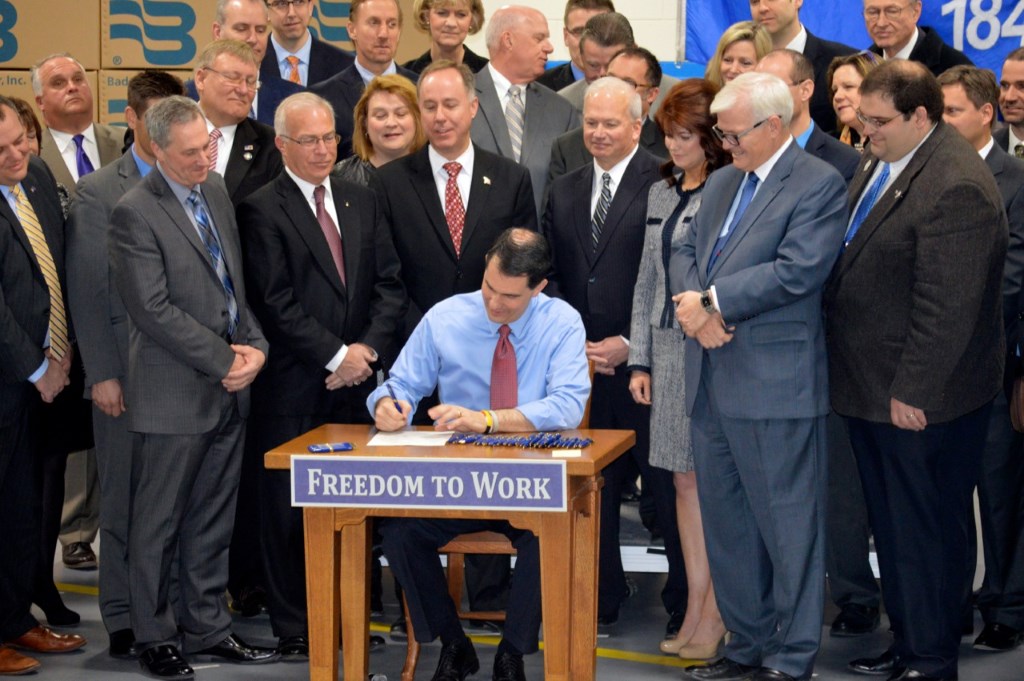Walker’s Next Budget
It won't have higher gas taxes for roads, but might have more support for K-12 schools.
Governor Walker’s public statements and his instructions to state agencies on how to develop their proposals for Wisconsin’s next state budget give some glimpses into what the state’s 2017-19 budget might bring.
Wisconsin has a two-year budget. The process of deciding what to include in the budget starts in the summer of even numbered years — in other words, now — when the Governor instructs state agencies how to develop budget requests. Agencies submit their requests to the Governor in September, and the Governor takes the requests into consideration when developing his own budget proposal to submit to the Legislature. The Governor is expected to release his budget proposal in the early part of 2017. (For more about the Wisconsin state budget cycle, check the Wisconsin Budget Project’s Budget Toolkit.)
For the upcoming budget, Governor Walker has instructed state agencies to assume there will be zero growth in General Purpose Revenue (GPR) appropriations. In other words, he wants agencies to submit budget requests that are not any higher their budgets were two years ago, even though inflation and other factors have pushed costs up.
The Governor has carved out some exceptions to his zero-growth policy, including ones for:
- State support for K-12 schools. This exception may signal he is open to an increase in resources for public schools, which could help ease some of the very deep cuts that Wisconsin has made in education funding in recent years. Wisconsin state support for K-12 education dropped by 14% between 2008 and 2014, one of the biggest decreases in the country;
- Certain health and assistance programs, including Medicaid. Medicaid, like other entitlements, has routinely been exempted from spending freezes because there is typically growth in caseloads and increases in the cost per participant;
- State-level efforts to make sure children are safe in their own homes, or placed in safe foster or adoptive homes;
- Employment services for people with disabilities; and
- Increased costs to provide services at prisons and other state institutions.
He also reminded agency heads that new legislation requires them to also submit a second budget proposal with a five percent reduction in the agency budget.
The Governor’s instructions this year state that Wisconsin “has a goal of increasing the ongoing receipt of federal funds where the use of federal funding is consistent with state program goals.” That’s an interesting development because in past years the Walker administration has not prioritized the receipt of federal funds, and has taken pride in turning down some large sources of federal dollars. The new instructions direct agencies to look for areas where unexpended federal grants could be reallocated “to other activities to the extent possible under state and federal rules,” and they authorize agencies to submit policy papers by September 15 that identify “additional federal grant opportunities that were not included in the agency’s request.”
One such opportunity, which we hope the Deptartment of Health Services will write up in a policy paper, is the receipt of federal funds for the expansion of BadgerCare. According to the most recent LFB analysis on the topic, issued last December, boosting the BadgerCare income limit for adults to 133% of the federal poverty level in 2016 (from 100% of FPL) would have saved state taxpayers $323.5 million during the 2015-17 biennial budget period, while covering an additional 83,000 adults. Similar savings could be achieved in the next biennium.
The Governor made his opposition to increasing the gas tax or vehicle registration fee very clear, telling the Secretary of Transportation that “raising the gas tax or vehicle registration fees without an equal or greater reduction in taxes elsewhere is not an option, and it would throw a wet blanket on our growing economy.”
The problem is that the state does not have nearly enough money from the gas tax and other dedicated sources to pay for the highway projects currently planned. In fact, the state is projected to fall over $900 million short in transportation funding over the upcoming two-year budget period, according to a recent memo from the Legislative Fiscal Bureau. That figure assumes the state doesn’t borrow any additional money for transportation purposes.
Governor Walker’s letter told the Department of Transportation that “proposed spending on mega projects in Southeastern Wisconsin should be minimized” to save money and bring spending back into line with available resources. But the Governor has also “told the Federal Highway Administration that his administration wants to kick off an $850 million project to widen an east-west stretch of I-94 between the Marquette and Zoo interchanges from six lanes to eight,” according to an article in the Milwaukee Journal Sentinel. Those statements seem to be in conflict with each other.
The budget instructions give no indication that Governor Walker is considering rolling back the very large budget cuts lawmakers have made to the University of Wisconsin System. However, Governor Walker hopes to extend the UW tuition freeze for another two years, according to an article in the Wisconsin State Journal. A tuition freeze can help keep higher education affordable for families, but it needs to be accompanied by an increase in state funding to ensure that the UW System has the resources in order to continue to provide high-quality education to our students.
Wisconsin Budget
-
Charting The Racial Disparities In State’s Prisons
 Nov 28th, 2021 by Tamarine Cornelius
Nov 28th, 2021 by Tamarine Cornelius
-
State’s $1 Billion Tax Cut Leaves Out 49% of Taxpayers
 Sep 21st, 2021 by Tamarine Cornelius
Sep 21st, 2021 by Tamarine Cornelius
-
TANF Program Serves a Fraction of Poor Families
 Aug 30th, 2021 by Jon Peacock
Aug 30th, 2021 by Jon Peacock




















When you note that spending on education dropped by 14 percent under Walker, why not note that the spending was merely asking teachers to pay their fare share to their pension and medical. Most pension in the real world ask for some compensation from the worker, but not only did the teachers unions demand taxpayers pay everything, the unions even had the balls to make tax payers purchase bloated overprice medical coverage provided by the unions themselves. Shame on the public unions.
Shame on police and firefighter unions indeed Jason. I agree. They are despicable.
Nope, try again Jason. The cuts to education have gone well beyond what the one-time tools from Act 10 may have “saved.” Get off the talking points and learn some math.
And note that the revenue shortfalls aren’t even accounted for here, nor is the increasing amount of debt that has to be paid off in coming years due to Walker’s choice to skip debt payments in each of the last 2 years
Jason sure can repeat exactly what he hears on talk radio. Kudos for your parroting skills.
Scotty boy is up to yet another trick to play on his state republican supporters to keep them in a state of illusion which hides his politcal and leadership incompetence.
The nation GOP base peaked his card during his pipe dream presidential campaign which failure cost Scottie 1 million dollars of unpaid debt.
Oh my goodness how will he repay his supporters?
Anyways back home here in Wisconsin his budget is short the reported 900 million dollars in the transportation coffer and perhaps more in other unreported State government agencies but reading between the liness of this report, Scottie plans on commandeering (By State “Home Rules”) federal grant funding to every WI State agency over the next two years perhaps longer if he is sadly relected to balance the State budget.
I thought, as is reported about national GOP dogma dictating less borrowing from the Federal Government. You all know what I mean, the GOP rethoric about BIG GOVERNMENT IS TOO BIG.
But who am I to question the likes of tricky dicky politicans the likes of Scott Walker?
Interesting to note that there are more teachers in the class room now then when Scott took over. Your headline is a red herring.